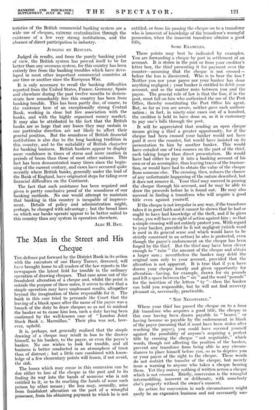The Man in the Street and His Cheque •
Tim defence put forward by the District Bank in its action with the executors of one Harry Turner, deceased, will have brought home to all readers of the law reports in the newspapers the latent field for trouble in the ordinary operation of drawing cheques. That case arose out of the fraudulent alteration of a cheque and, whilst the point is outside the purpose of these notes, it serves to show that a simple operation may have unpleasant results, altogether beyond the imagination of those responsible for it. The bank in this case tried to persuade the Court that the leaving of a blank space after the name of the payee was a breach of the duty to draw cheques so as not to mislead the banker or to cause him loss, such a duty having been confirmed by the well-known case of ", London Joint w Stock Bank v. Macmillan." Their plea was not, how- ever, upheld.
It is, perhaps, not generally realized that the simple drawing of a cheque may result in loss to the drawer himself, to his banker, to the payee, or even the payee's banker. No one wishes to look for trouble, and all business is better conducted in an atmosphere of trust than of distrust ; but a little care combined with know- ledge of a few elementary points will lessen, if not avoid, the risk.
The losses which may ensue in this connexion can be due either to loss of the cheque in the post and to its finding its way into the hands of someone who is not entitled to it, or to its reaching the hands of some such person by other means ; the loss may, secondly, arise from fraudulent alteration on the part of a wrongful possessor, from his obtaining payment to which he is not entitled, or from his passing the cheque on to a transferee who is innocent of knoWjedge of the _transferor's wrongful possession, when the innocent transferee obtains a good title.










































 Previous page
Previous page